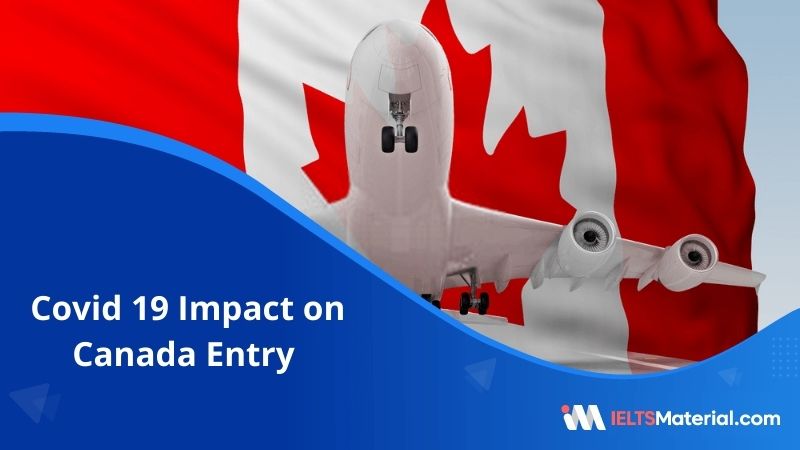Covid 19 Impact on Canada Entry
Table of Contents

Limited-Time Offer : Access a FREE 10-Day IELTS Study Plan!
The Covid-19 pandemic has had a significant influence on the Canadian immigration system.
Canada has imposed travel restrictions and rules after Covid-19. Therefore, it’s critical to understand who is permitted to travel to Canada and how this affects you.
Who can travel to Canada?
The list of people who are permitted to travel to Canada currently are as follows:
- Permanent Canadian residents
- Canadian citizens
- Immediate family of permanent citizens or residents of Canada – The immediate family includes dependent children, common-law partners, spouses, grandparents, grandchildren, step-parent and guardian or tutor.
- An extended family member of permanent citizens or residents of Canada
- Foreign nationals with a valid Permanent Residence Confirmation (COPR)
- Temporary foreign workers
- Foreign nationals may enter Canada on humanitarian and compassionate grounds in rare situations, such as terminal sickness, significant injury, or death.
- International students with valid study permits or who had been authorised for a study permit on or before March 18, 2020.
- International students enrolled in a Designated Learning Institution that has received prior approval from the provincial government for its COVID-19 response plan. (As of October 20, 2020, this policy is in effect.)
Recent travel-related updates of Canada (Effective August 2021)
Opening Canada’s borders is contingent on the reversal of the country’s COVID situation.
- Since August 9, 2021, fully vaccinated U.S. citizens and permanent residents currently residing in the United States are allowed to enter Canada for discretionary (non-essential) travel.
- From September 7, 2021, the government of Canada plans to open the borders to all fully vaccinated people who have completed their entire (2) doses of vaccinations approved by the Canadian government.
- You are advised to arrive 14 days prior to the arrival time and fulfil all the entry protocols related to Coronavirus.
Guidelines for Fully Vaccinated travellers to Canada
According to the regulations of the Canadian government, you must follow certain guidelines if you have finished all vaccination doses of Canadian authorised vaccinations – AstraZeneca(Covishield), Pfizer, Moderna, or Johnson Johnson – at least 14 days before arriving in Canada.
Pre-entry requirements
All fully vaccinated people must arrange quarantine and take a COVID test within 72 hours of arrival in Canada. The ArriveCAN app must be used to give testing data. Travellers must also provide their ArriveCAN receipt as well as the necessary documents, which include proof of a negative pre-entry test and a digital or print copy of their proof of vaccination.
Upon Arrival
You must submit information and paperwork, including evidence of vaccination, and undergo health screening when you arrive in Canada. In addition to this, before entering Canada, you will be required to comply with all public health precautions, including wearing a mask, retaining a copy of your immunisation records, test results, and a list of close contacts and locations visited in the previous 14 days.
What if you fulfill all the necessary protocols?
Those who meet all of the entrance conditions will be excluded from the 14-day quarantine period as well as the day-eight testing.
Unvaccinated children under the age of 18 will also be exempted from the hotel quarantine.
Guidelines for Partially Vaccinated travellers to Canada
Pre-entry requirements
Before arriving in Canada, you must provide contact and travel-related information to arrive. In addition, you must show confirmation of a negative Covid-19 test report if you were infected with Coronavirus within the past 90 days of your arrival. Ensure you take the test within 72 hours of arrival. These rules do not apply to children under the age of five.
If you have caught Covid 14 to 90 days before entering Canada, you must additionally submit confirmation of a positive Covid-19 test report.
Upon Arrival
The first covid-19 test must be completed upon arrival, and the second test must be completed within 8 days. In addition, a 14-day quarantine is required. All flight travellers must stay in government-approved lodging for three nights at their own expense. Those who test positive when they arrive will be quarantined for 14 days.
If you have previously been infected with Covid 14 to 90 days before entering Canada, then criteria mentioned above are waived. Additionally, you must produce your positive Covid-19 test report prior to your entry.
Canada Mandatory Hotel Quarantine
- Pay for all expenses related to three nights of lodging at a government-approved hotel.
- Self-monitor for Covid-19 symptoms and report them to ArriveCAN on a daily basis.
- Unless escorted by officials, stay in your designated room.
- Unless there is a medical emergency, it is not permissible to leave the hotel room.
Travel guidelines for Indians flying to Canada
- All flights from India to Canada have been suspended until September 21, 2021, because of the current covid instances in India.
- Before travelling to Canada, Indian travellers utilising an indirect route are needed to take a negative Covid-19 test. If you have previously tested positive for Covid, you must produce proof of a positive Covid-19 test taken within the last 14 to 180 days prior to entering Canada. It is necessary to get proof from a third nation. You may also be required to spend at least 14 days in a third nation.
- If you test positive while travelling, you will be quarantined and transported back to your starting location.
What Documents do you need to travel to Canada?
- Negative Covid Report or Proof of full Vaccination Certificate
- Valid work permit/valid study permit
- Letter of introduction from IRCC dated before March 18, 2020
Canada cross-border permission letter and requirements
- From August 9, 2021, travellers will not be scheduled for a three-night hotel stay.
- Foreign nationals that are fully vaccinated will be permitted to enter Canada.
- From August 9, 2021, American citizens or permanent residents who qualify for the complete vaccination traveller exemption will be exempted.
- All foreign nationals who meet the requirements for fully vaccinated tourists will be welcomed beginning September 7, 2021.
Canada immigration news to International students
- International students with valid study permits or an IRCC letter of introduction may enter Canada from other countries.
- If you are approved for a study permit before March 18, 2020, you can travel to Canada.
- Suppose you’re a student attending a Canadian Designated Learning Institution that has obtained prior approval of its response plan to control the spread of COVID-19 from the government. In that case, you will be able to travel to Canada. (Effective October 20, 2020)
- Before boarding the flight, you will be subjected to a medical examination. You will not be allowed to travel if Covid-19 symptoms are discovered.
- You are required to submit proof of Covid-19 tests.
Current Immigration process to Canada
Is Canada still accepting new applications?
Yes, new permanent residence applications are still being accepted in Canada. However, the procedure is being held up owing to Covid-19.
Have you submitted an application and are waiting for it to be processed?
Case: If you have not received the letter of invitation to apply, but your official account says approved.
Reasons: It is possible that officials didn’t send you the letter because you were not exempted from travel restrictions, or they couldn’t issue your documents because of some reason.
Can you enter Canada with a work permit?
Yes, you just have to fulfil all the requirements.
Canada Express Entry – Are there delays in processing the applications?
Despite the pandemic-related limitations, Canada continued to issue Invitations to Apply (ITAs) through the Express Entry system.
On February 13, virtually every Express entry applicant qualified for the Canadian Experience class was asked to apply for permanent residence in Canada. Around 90% of the candidates were qualified. Therefore, there are no delays in Express Entry applications.
Quebec Immigration
Quebec continues to accept applications for permanent residence, but the processing time is likely to be affected by the coronavirus crisis.
Explore IELTS related articles

Start Preparing for IELTS: Get Your 10-Day Study Plan Today!








Post your Comments